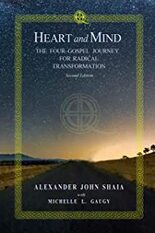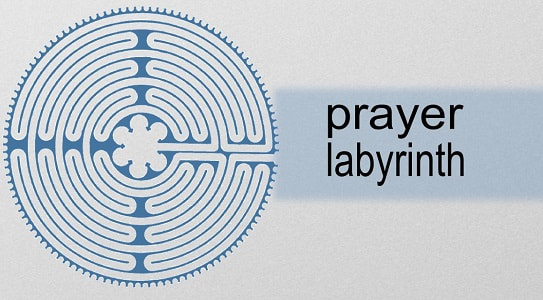This 6-Session Bible Study explores...
|
How do we face change? How do we move through suffering? How do we receive joy? How do we mature in service? Spend some time with Alexander J Shaia as he uses the great map of the four Gospels, just as the Christians used, to guide us on the Christ journey - one of love, growth and transformation. The series includes 6 conversation films with Alexander, a discernment and discussion guide, and transcripts of the conversation.
Welcome to The Four-Gospel Journey, Revealing the Path of Transformation & Deepening Love |
|
|
December 17, 2020 - Session Six
The Essential Practices of the Journey
|
GOING DEEPER
Shaia describes freedom as “Christ’s non-judgmental love that makes us want to grow.” He goes on to say, “Love calls to Love,” and that the practice of freedom includes acceptance of yourself exactly how you are. How do you define freedom? Do you have a practice of freedom? Shaia says that “True freedom requires safe boundaries.” It requires us to act with honor and respect for ourselves and others. What boundaries have you established that serve you and others well? What are areas of respect and honor for yourself and others are in your awareness that need work? Making room for the other is a lofty concept, but not an easy practice. The other doesn’t come into community with ease, ever. They come in with challenge and opportunity. |
They are messengers who bring us our internal transformational work assignments. They remind us our perspective is one of many, and that there is another line of sight to consider. They teach us unconditional love. How do you welcome the other in your life? How do you serve the other with your life?
Shaia says, “We need to remember, that as we go to the world in service, that we live in a cosmos that is already the Christ. And so, therefore we do not fight people. We bring awareness to new ideas, to new concepts, to new experiences.” We must continue to speak truth in union in love.” To do that, we remember not to create stories about others that in any way make others superior or inferior to everyone else. We don’t demonize, we humanize. Do you notice a tendency in you to inflate or deflate others? How can you work to bring this habit into your awareness so you can remind yourself of our equality? We have become accustomed to our houses, our grocery stores, and other modern conveniences. We have forgotten the rhythm of life as seen through the changing of the seasons. Shaia poetically welcomes us to “absorb the deeper rhythms” of the cycles of life as seen through the changing of the seasons or the cycle of one day. How are you drawn to the outward expressions of living, dying, and rising as a comfort to your inner rhythm of the journey? What four words do you have to express where you are at the end of this series? |
December 3 & 10, 2020 - Session Five
Maturing Through Service: Walking Luke's Road of Riches
|
GOING DEEPER
Going back to your personal reflection throughout this study, and learning what your gift is to the world, think upon how you walk that forward in your every day life. Where has your gift led you? Who do you walk alongside? How do you share your gift? |
Does sharing your gift still bring you joy? What else brings you joy?
How have you learned to serve from the heart center? Where your service is not centered around your identity or ego needs, but something that you do because you can’t not do it? What, in your experience, are the true riches of life? Reviewing all of your answers for session five, what four words stand out to you about your gift and what you are made to do? REFLECTION
“We will so appeal to your heart and to your conscience by our ability to love in the face of what others see as great suffering, that when we win our freedom, the victory will be twofold, for we will win yours as well.” - Martin Luther King adapted by Alexander John Shaia |
November 19, 2020 - Session Four
Receiving Gifts: Resting in John's Glorious Garden
|
GOING DEEPER
Going back to your personal reflection in the past two sessions, talk about how it felt to get to the other side of your fears and challenges. Try to remember as much detail as possible about what it felt like in your mind, heart, and body. What was the gift you received from the work? Write it all down or consider another form of artistic expression to tell this part of your journey. The lowest lows and the highest highs are what have been our teachers along the path, all of which brought us to where we stand with a greater openness and acceptance. The third path comes with the question: “How do we receive joy?” How do you practice opening up to joy? How do you receive it and rest in it? |
Shaia describes the Third Path as the experience of joy and union, and goes on to say that what unifies us is greater than what separates us. Each of us “are already made of the incorruptible substance of God,” and he goes on to explain Christianity as “the first tradition on record to be pan-tribal.” This changes the table-dynamic drastically. Where are you at with welcoming those who seem obviously “other” to your table? Who are the most challenging people for you to pull up a chair for? What keeps you from making room for them at the table of your heart?
What else in this film made an impact on you? Considering all of your answers for this session, what four words stand out to you about how you receive joy or experience unity? |
November 12, 2020 - Session Three
Moving Through Trials: Crossing Mark's Stormy Sea
|
CLICK HERE for Life in the Early Church, AD. 33 to 313 by A. E. Welsford, Seabury Press (c) 1955?, Chapter 4, Rome, The Apostles and Nero (Reprinted by permission of the Publisher, Seabury Press)
GOING DEEPER
We have begun facing the fears we need to face to become willing to face our fears. Some people refer to this as shadow work. Acknowledging our character defects so they no longer rule us. It is through this early work that (even though it is hard) we gain courage to continue onward because through it we continue to gain the reward of knowing more of who we truly are and who we are truly meant to be. This is how we receive the gift of our life, and come to understand how it is a gift to the world. |
This next path shows up now with even more challenges, because now that we have found a way to be willing, our greatest fears show up with a knock on the door wanting to make sure we really believe in where we are headed. So, our deepest fear comes to us as both danger and opportunity asking “Are you willing to die for your life?”
Going back to your previous reflection, and the invitation to change you wrote about in the previous session’s work, what was the deepest fear you hoped you wouldn’t have to face? Write about it. When the “knock at the door" happened for you, what did that uncertainty coupled with inevitability feel like? How were you able to have the strength and will to turn the knob and welcome this challenge across the threshold? In the face of tremendous anxieties, depression and despair, what was your answer to this moment? How did you greet your suffering? Could you go deeper into the difficulty of the moment? What gave you hope? Can you invite the “appropriate difficulties and sufferings” toward you for the transformation of your heart? What four words from any of your answers about the stand out to you about how you face your fears? |
November 5, 2020 - Session Two
Waking and Facing Change: Climbing Matthew's Great Mountain
|
GOING DEEPER
Hearing the summons to the journey isn’t necessarily easy to decipher. Not like ringing bells or the blast of a trumpet or a thunderous voice from the sky. Sometimes it looks like the rock bottom of addiction, or perhaps a nervous breakdown or depression setting in. A phone call from the doctor’s office. Losing your spouse or friends or job. A lot of times it seems to come at you out of nowhere. The world as you know it is crumbling and you are left standing there covered in ash. |
Reflect on your life. Take the time to really remember and feel a time you were at the onset of change. Maybe your life had become unmanageable, or maybe you just couldn’t remain the same one more day. When you feel you are connected to the emotion of that time, to your best ability, describe how the invitation to change arrived, and how that felt.
Where are you? What happened? Who was there? Was there an apocalyptic voice? What did it voice say? Was there a moral voice? What did it voice say? What, if anything, were your coping mechanisms? In other words, what did you try to use to distract your self from the pain? Did you have a point of surrender? What was it? Where and when (if at all) did you sense God? Using your reflection, come up with four words that describe how you face change. |
October 29, 2020 - Session One
reparing Heart and Mind for the Journey
|
GOING DEEPER
Perhaps after watching the introductory film and at the onset of the journey, you could consider a personal examen from “the map” of the Jewish Passover celebration as given by Shaia: Examen for your life with God and your community: First Question Today, where are you locked in slavery? Where are you locked in emotional paralysis? Where are you locked in fear, anxiety, despair? Are you willing to hear God’s voice of liberation in that place for yourself ? |
Second Question
Where today are you in a desert unto death? What today in you needs to die? What in you is standing in the way of God and Spirit? Third Question Where today are you hearing God’s new promise in your life? Where are you rejoicing in God’s new message? Fourth Question What action of God are you committing yourself to for the life of your family, for your community between now and the end of this film series? As Shaia suggests, throughout this series one of these questions may rise as the most prevalent for you. Lean into the question, continue to get more honest as you can. How do you experience The Christ now? Are you willing to experience The Christ anew? Using your answers to the questions above, what four words stand out to you about where you are at in life? |

